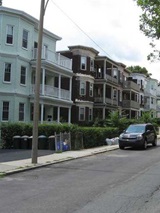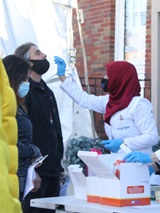
Article
8 Key Findings from 2 Years of the COVID Community Data Lab
Two years and 48 research briefs later, this final analysis summarizes eight key findings from the COVID Community Data Lab.
Read More
Launched in April 2020 by Boston Indicators and the Center for Housing Data at the Massachusetts Housing Partnership, the COVID-19 Community Data Lab was created to capture and analyze the wide-ranging social and economic impacts of the COVID-19 pandemic on Greater Boston. Throughout the pandemic, the CCDL grew to include three parts: 1) research briefs on topics ranging from housing stability to traffic patterns; 2) a repository of charts and graphs analyzing a range of real-time data sources; and 3) the Seizing the Moment: Proposals for a Just and Equitable Recovery series that present concrete ideas for building back better, written by a range of community voices.
As of June 2022, the CCDL is no longer being updated by Boston Indicators or the Center for Housing Data. Indicators will continue to publish work related to the impacts of COVID-19 on the region, but it will no longer be directly linked to the CCDL. We thank all of the community partners that made this ambitious research effort possible, especially the Barr Foundation for their early support.

Two years and 48 research briefs later, this final analysis summarizes eight key findings from the COVID Community Data Lab.
Read More
Unprecedented new public funding has helped keep lower-income families in their homes during the pandemic. What can we learn from the state response?
Read More
Eviction filing rates by city/town and deployment of rental assistance are uneven.
Read More
Public school enrollment in Massachusetts remains 4 percent below pre-pandemic levels. And enrollment in Boston is down 9 percent.
Read More
Depending on where the rulemaking process lands, this promising new law could in practice net thousands of new homes – or almost none.
Read More
Greater Boston’s biggest growth node straddles the Mystic and Malden Rivers, at the intersections of six cities. No government body is now charged with managing its growth into a coherent, connected, and inclusive place.
Read More
Our public health infrastructure in Massachusetts is inadequately funded and our approach is too fragmented across 351 separate cities and towns.
Read More
With young children joining work Zooms and parents leaving jobs due to lack of stable childcare, it is time to make systemic change.
Read More